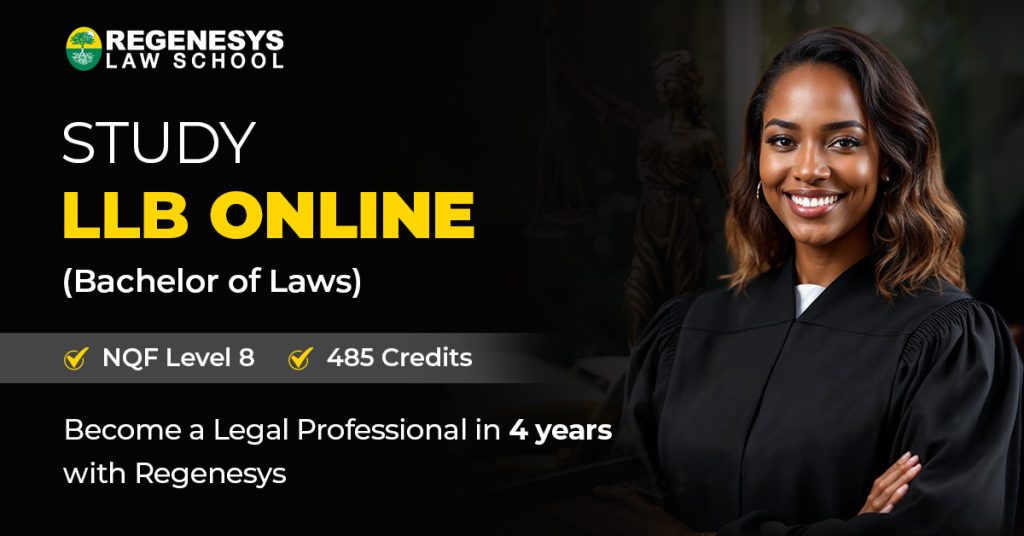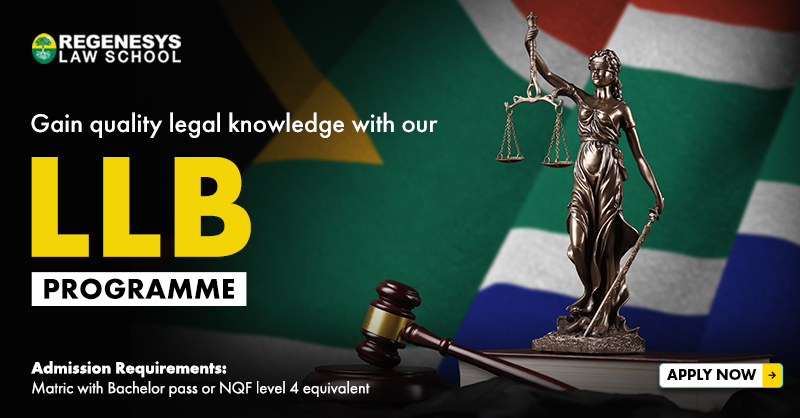The Bachelor of Laws (LLB) is a four-year undergraduate programme that equips students in South Africa with in-depth legal knowledge, focusing on core law subjects, curriculum structure, and entry criteria. Covering essential topics like criminal law, constitutional law, and contract law, the programme prepares learners for diverse careers in the legal field. Students gain clarity on the law subjects included in the LLB, the entry requirements for admission, and the flexible study modes available across institutions.
This article provides a clear and accessible breakdown of the Law subjects you will study, including the LLB entry requirements and the law subjects needed at matric level.
Table of Contents
What is the LLB Programme?
Law is central to every aspect of life , from protecting basic human rights to regulating industries and resolving disputes. The LLB, or Bachelor of Laws, is an undergraduate degree that prepares individuals to interpret, apply, and uphold the law across different fields. It blends academic study with practical insights and ethical grounding, developing future legal professionals who are analytical, thoughtful, and community-focused.
In South Africa, the LLB is recognised as the gateway to becoming an attorney or advocate. It typically takes four years to complete and provides a strong foundation in law subjects such as constitutional law, criminal law, and civil procedure.
At Regenesys Law School, the CHE-accredited LLB programme combines theoretical knowledge with real-world application. Through case-based learning and guidance from experienced legal professionals, students develop critical thinking, legal research, and problem-solving skills.
Here’s a quick summary of the Regenesys LLB qualification:
- Qualification Type: Undergraduate Degree
- NQF Level: 8
- Duration: 4 Years
- Credits: 485
- Study Mode: Online & Contact
- SAQA ID: 119076

Why Study LLB in South Africa?
Pursuing an LLB in South Africa means studying within a legal system that is both diverse and deeply rooted in constitutional values. The qualification is widely respected and offers graduates multiple career opportunities, locally and globally.
Listed below are some reasons why students should consider South Africa for their LLB education:
1. Industry Demand
Legal expertise is in high demand across South Africa’s sectors – from government to finance, healthcare to tech. The increasing complexity of laws and regulations creates a need for professionals who can interpret and apply them accurately.
2. Career Relevance
An LLB degree opens the door to a wide variety of career options, including roles in legal practice, policy-making, and advisory positions. Graduates are prepared to work in the public or private sectors and contribute to meaningful legal change. The LLB subjects that South African institutions offer are aligned with national development goals, ensuring students are job-ready upon graduation.
3. Local and Global Recognition
The LLB is not only valid within South Africa but also respected in many other legal jurisdictions. With further accreditation or training, LLB graduates can pursue international opportunities.
4. Ethical and Social Impact
The programme promotes a strong sense of justice, ethics, and civic responsibility. It equips students to serve the public interest, protect rights, and ensure fairness in legal systems.
Find out Essential Guide To Pursue LLB Degree in South Africa here!
Programme Curriculum & Duration
Understanding the curriculum and duration of an LLB programme is essential for anyone considering a legal career. The structure not only shapes your knowledge but also influences how well-prepared you are for professional practice. A well-designed curriculum balances theoretical learning with practical exposure, and duration gives students time to develop the necessary legal thinking and research skills.
Regenesys Law School offers a four-year LLB programme built on legal principles, ethics, and real-world case studies. It includes 485 credits and spans a wide range of core and elective subjects.
The following table outlines the main law modules in the Regenesys LLB curriculum:
|
Year |
Semester 1 Law Subjects |
Semester 2 Law Subjects |
Electives (Choose Any 2) |
|
Year 1 |
Computer Literacy Family Law Law of Persons Legal English Pillars of South African Law 1 Foundational Personal Mastery |
Computer Literacy (Legal Research) Emotional and Spiritual Intelligence Pillars of South African Law 2 |
Business Management Economics Financial Accounting |
|
Year 2 |
Constitutional Law Jurisprudence Law of Contract 1 Law of Succession Roman Law |
Bill of Rights Law of Contract Specific Contracts Legal Interpretation Legal Pluralism Patent and Copyright Law |
– |
|
Year 3 |
International Law Intellectual Property Law Law of Delict Law of Evidence Law of Business Entities |
Administrative Law Introduction to Tax Law Law of Evidence 2 Law of Property Research Methodology |
– |
|
Year 4 |
Criminal Law 1 Labour Law Law of Civil Procedures 1 Law of Criminal Procedures 1 Legal Ethics and Practice |
Criminal Law 2 Law of Civil Procedures 2 Law of Criminal Procedures 2 |
Accounting for Legal Practice Cyber Law Deceased Estates Environmental Law Insurance Law International Business Law Medical Law |
Know How to Study Law Effectively? Strategies for LLB Students here!
Eligibility Criteria
Choosing to study law is a major commitment, and institutions want to ensure students are ready for the academic demands. Eligibility criteria are put in place to identify individuals who possess the language skills, reasoning ability, and educational background required to succeed in the programme.
At Regenesys, the LLB entry requirements are designed to be inclusive yet rigorous. Whether you are a school leaver or an international student, meeting the criteria ensures you can fully engage with the content.
Meeting the LLB eligibility in South Africa ensures that applicants are academically prepared to engage with the rigorous legal curriculum and succeed in their studies.
The following are the main eligibility criteria for admission to the Regenesys LLB programme:
- Matric with Bachelor pass or NQF level 4 equivalent qualification
- English 1st – 50% | English 2nd – 60%
- A levels for International students (Africa)
- Higher level pass for international students 26 APS
- Competent in Mathematics, English, written and oral communication skills at NQF Level 4
- Basic computer skills, internet connection and relevant IT resources
Understand Bachelor of Law Entry Requirements in South Africa: Your Guide for Starting a Legal Career here
Can I Study Law Without Maths?
Yes, you can study law in South Africa without Mathematics. Most universities do not require it as a compulsory subject for LLB admission. Instead, the main focus is on your National Senior Certificate (NSC) with a Bachelor’s pass, strong English results (usually 50% for English Home Language or 60% for First Additional Language), and an APS score of around 26 or higher.
While Mathematics is not a strict requirement, having it can strengthen your analytical and problem-solving skills, which are valuable in legal studies. Many universities also accept Mathematical Literacy, provided you meet the overall APS requirements.
Remember, at Regenesys, applicants are expected to be competent in Mathematics, English, and written and oral communication skills at NQF Level 4. This ensures that students are well-prepared for the reading, reasoning, and analytical demands of the LLB programme.
Career Opportunities After LLB
Earning an LLB degree opens the door to a diverse range of careers. The legal profession offers stability, intellectual stimulation, and the opportunity to make a tangible difference in society. Whether working in the courtroom, corporate office, or a non-profit organisation, LLB graduates find fulfilling paths in law and beyond.
The skills gained from studying law subjects – such as critical thinking, analysis, and communication – are highly transferable and valued across sectors. Graduates are equipped to handle complex legal issues, provide sound advice, and advocate for justice.
Listed below are some job roles that graduates can explore in South Africa:
1. Assistant Prosecution Officer
Supports senior prosecutors by preparing case files, reviewing evidence, and assisting in the presentation of criminal cases in court.
2. Law Professor or Teacher
Educates students in various branches of law, conducts academic research, and contributes to legal scholarship through teaching and publishing.
3. Legal Adviser
Offers legal guidance to organisations, ensuring that operations comply with laws and regulations.
4. Legal Journalist
Covers legal news, court cases, and legislative developments for media outlets, translating complex legal matters into accessible content for the public.
5. Legal Researcher
Investigates legal precedents, statutes, and regulations to support legal development or academic study.
6. Public Prosecutor
Acts on behalf of the state to prosecute criminal cases, presenting evidence in court and ensuring justice is served in accordance with legal procedures.
Graduates find employment across several key sectors such as law firms, public service, banks, corporates, NGOs, and universities. The demand for legal professionals extends to regulatory bodies and international agencies as well.
Know Career Opportunities for Bachelor of Law (LLB) Graduates here

LLB vs Other Qualifications
There are various pathways in the legal and justice sector, and it’s important to choose the one that matches your career goals. While the LLB is the most direct route to becoming a practising legal professional, alternative qualifications like a paralegal diploma or a degree in family law may suit different needs.
Paralegal qualifications offer a shorter route to employment and focus on legal support roles, while family law qualifications are often part of specialised legal training for those focusing on domestic issues. In contrast, the LLB provides broader legal training and access to roles like attorney or advocate.
|
Feature |
LLB Programme |
Paralegal Qualification |
Family Law Practitioner |
|
Duration |
4 Years |
2 Years |
18 Months |
|
Entry Criteria |
NSC with Bachelor Pass |
NQF level 4 Qualification |
NQF level 4 Qualification |
|
Career Outcome |
Legal Professional |
Paralegal |
Family Law Adviser |
|
Best for |
Legal Practice & Courts |
Legal Support |
Family Law Matters & Mediation |
Read on BCom Law vs LLB: Curriculum, Career Paths, and Opportunities here
Study Mode Options
Modern learners need flexibility in how they pursue education. The Regenesys LLB programme offers multiple study modes to support students with different needs, whether they are working professionals or full-time learners. The mode of study can impact how you manage your schedule, access resources, and interact with peers and faculty.
- Online Learning: Designed for flexibility, this mode allows students to access programme material, submit assessments, and interact with lecturers through a digital platform. It’s ideal for those balancing studies with work or personal commitments.
- Contact Learning: Offers in-person instruction on campus, enabling real-time discussions, immediate feedback, and structured learning environments. It is well-suited for students who benefit from face-to-face engagement and a fixed routine.
Fees & Funding Options
Studying for an LLB in South Africa comes with associated costs such as tuition, materials, and application fees. These vary depending on the institution and mode of study. Fortunately, several funding options are available to ease this financial burden.
At Regenesys, we offer a range of flexible funding solutions to make quality education more accessible:
- Student Hero: A no-cost platform that helps students apply for and compare finance offers from top South African lenders.
- Fundi: Provides tuition loans, device financing, accommodation support, and e-learning tools.
- FlexiPay: Regenesys’ in-house payment plan that allows tuition to be paid in affordable monthly instalments.
- Capitec Education Finance: Offers up to R500,000 with low fixed interest rates and up to 84 months to repay.
- Nedbank Education Loan: Grants up to R400,000 with flexible repayment terms.
All funding options are subject to eligibility and approval. Students are encouraged to explore both internal and external sources of support.

Conclusion
The LLB programme is a stepping stone to a fulfilling and respected career in the legal field. By covering a comprehensive range of law subjects and providing strong ethical grounding, the LLB equips students with the tools to impact society positively. Whether your goal is to work in advocacy, public service, or private law, this qualification opens diverse opportunities in South Africa and beyond. With flexible study modes and accessible funding options, the Regenesys Bachelor of Laws programme ensures that your journey toward becoming a legal professional is both achievable and rewarding.
Ready to begin your legal journey with a graduate LLB?
Speak to our Adviser to take your next step.
Exploring Law Subjects – FAQs
Is an LLB in South Africa worth it?
Yes, especially if you’re passionate about law and justice. The qualification opens doors to high-impact careers.
Can I study LLB part-time or online?
Regenesys Law School offers an accredited online Bachelor of Laws that allows students to manage work and personal commitments with their education.
What subjects are in LLB?
The LLB programme includes law subjects like criminal law, contract law, constitutional law, and more.
Which subjects are required for law?
The subjects needed for law include English and Mathematics, with an APS score of at least 26.
What are the LLB entry requirements?
You need an NSC with a Bachelor pass, English proficiency, and basic computer skills.







